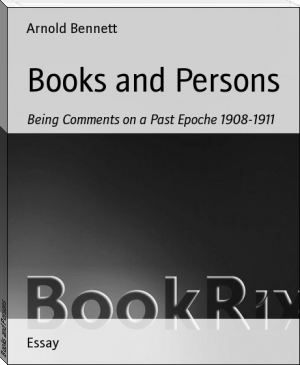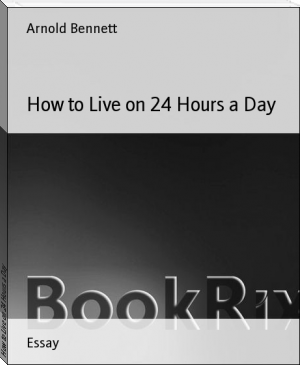The Author's Craft - Arnold Bennett (knowledgeable books to read TXT) 📗

- Author: Arnold Bennett
Book online «The Author's Craft - Arnold Bennett (knowledgeable books to read TXT) 📗». Author Arnold Bennett
artist's cleverness--the mere cleverness of adaptability which most first-class artists have exhibited. You can wear the fashions of the day. You can tickle the ingenuous beast's ear in order to distract his attention while you stab him in the chest. You can cajole money out of him by one kind of work in order to gain leisure in which to force him to accept later on something that he would prefer to refuse. You can use a thousand devices on the excellent simpleton.... And in the process you may degrade yourself to a mere popularity-hunter! Of course you may; as you may become a drunkard through drinking a glass of beer. Only, if you have anything to say worth saying, you usually don't succumb to this danger. If you have anything to say worth saying, you usually manage somehow to get it said, and read. The artist of genuine vocation is apt to be a wily person. He knows how to sacrifice inessentials so that he may retain essentials. And he can mysteriously put himself even into a potboiler. _Clarissa Harlowe_, which influenced fiction throughout Europe, was the direct result of potboiling. If the artist has not the wit and the strength of mind to keep his own soul amid the collisions of life, he is the inferior of a plain, honest merchant in stamina, and ought to retire to the upper branches of the Civil Service.
III
When the author has finished the composition of a work, when he has put into the trappings of the time as much of his eternal self as they will safely hold, having regard to the best welfare of his creative career as a whole, when, in short, he has done all that he can to ensure the fullest public appreciation of the essential in him--there still remains to be accomplished something which is not unimportant in the entire affair of obtaining contact with the public. He has to see that the work is placed before the public as advantageously as possible. In other words, he has to dispose of the work as advantageously as possible. In other words, when he lays down the pen he ought to become a merchant, for the mere reason that he has an article to sell, and the more skilfully he sells it the better will be the result, not only for the public appreciation of his message, but for himself as a private individual and as an artist with further activities in front of him.
Now this absolutely logical attitude of a merchant towards one's finished work infuriates the dilettanti of the literary world, to whom the very word "royalties" is anathema. They apparently would prefer to treat literature as they imagine Byron treated it, although as a fact no poet in a short life ever contrived to make as many pounds sterling out of verse as Byron made. Or perhaps they would like to return to the golden days when the author had to be "patronised" in order to exist; or even to the mid-nineteenth century, when practically all authors save the most successful--and not a few of the successful also--failed to obtain the fair reward of their work. The dilettanti's snobbishness and sentimentality prevent them from admitting that, in a democratic age, when an author is genuinely appreciated, either he makes money or he is the foolish victim of a scoundrel. They are fond of saying that agreements and royalties have nothing to do with literature. But agreements and royalties have a very great deal to do with literature. Full contact between artist and public depends largely upon publisher or manager being compelled to be efficient and just. And upon the publisher's or manager's efficiency and justice depend also the dignity, the leisure, the easy flow of coin, the freedom, and the pride which are helpful to the full fruition of any artist. No artist was ever assisted in his career by the yoke, by servitude, by enforced monotony, by overwork, by economic inferiority. See Meredith's correspondence everywhere.
Nor can there be any satisfaction in doing badly that which might be done well. If an artist writes a fine poem, shows it to his dearest friend, and burns it--I can respect him. But if an artist writes a fine poem, and then by sloppiness and snobbishness allows it to be inefficiently published, and fails to secure his own interests in the transaction, on the plea that he is an artist and not a merchant, then I refuse to respect him. A man cannot fulfil, and has no right to fulfil, one function only in this complex world. Some, indeed many, of the greatest creative artists have managed to be very good merchants also, and have not been ashamed of the double _role_. To read the correspondence and memoirs of certain supreme artists one might be excused for thinking, indeed, that they were more interested in the _role_ of merchant than in the other _role_; and yet their work in no wise suffered. In the distribution of energy between the two _roles_ common sense is naturally needed. But the artist who has enough common sense--or, otherwise expressed, enough sense of reality--not to disdain the _role_ of merchant will probably have enough not to exaggerate it. He may be reassured on one point--namely, that success in the _role_ of merchant will never impair any self-satisfaction he may feel in the _role_ of artist. The late discovery of a large public in America delighted Meredith and had a tonic effect on his whole system. It is often hinted, even if it is not often said, that great popularity ought to disturb the conscience of the artist. I do not believe it. If the conscience of the artist is not disturbed during the actual work itself, no subsequent phenomenon will or should disturb it. Once the artist is convinced of his artistic honesty, no public can be too large for his peace of mind. On the other hand, failure in the _role_ of merchant will emphatically impair his self-satisfaction in the _role_ of artist and his courage in the further pursuance of that _role_.
But many artists have admittedly no aptitude for merchantry. Not only is their sense of the bindingness of a bargain imperfect, but they are apt in business to behave in a puerile manner, to close an arrangement out of mere impatience, to be grossly undiplomatic, to be victimised by their vanity, to believe what they ought not to believe, to discredit what is patently true, to worry over negligible trifles, and generally to make a clumsy mess of their affairs. An artist may say: "I cannot work unless I have a free mind, and I cannot have a free mind if I am to be bothered all the time by details of business."
Apart from the fact that no artist who pretends also to be a man can in this world hope for a free mind, and that if he seeks it by neglecting his debtors he will be deprived of it by his creditors--apart from that, the artist's demand for a free mind is reasonable. Moreover, it is always a distressing sight to see a man trying to do what nature has not fitted him to do, and so doing it ill. Such artists, however--and they form possibly the majority--can always employ an expert to do their business for them, to cope on their behalf with the necessary middleman. Not that I deem the publisher or the theatrical manager to be by nature less upright than any other class of merchant. But the publisher and the theatrical manager have been subjected for centuries to a special and grave temptation. The ordinary merchant deals with other merchants--his equals in business skill. The publisher and the theatrical manager deal with what amounts to a race of children, of whom even arch-angels could not refrain from taking advantage.
When the democratisation of literature seriously set in, it inevitably grew plain that the publisher and the theatrical manager had very humanly been giving way to the temptation with which heaven in her infinite wisdom had pleased to afflict them,--and the Society of Authors came into being. A natural consequence of the general awakening was the self-invention of the literary agent. The Society of Authors, against immense obstacles, has performed wonders in the economic education of the creative artist, and therefore in the improvement of letters. The literary agent, against obstacles still more immense, has carried out the details of the revolution. The outcry--partly sentimental, partly snobbish, but mainly interested--was at first tremendous against these meddlers who would destroy the charming personal relations that used to exist between, for example, the author and the publisher. (The less said about those charming personal relations the better. Documents exist.) But the main battle is now over, and everyone concerned is beautifully aware who holds the field. Though much remains to be done, much has been done; and today the creative artist who, conscious of inability to transact his own affairs efficiently, does not obtain efficient advice and help therein, stands in his own light both as an artist and as a man, and is a reactionary force. He owes the practice of elementary common sense to himself, to his work, and to his profession at large.
IV
The same dilettante spirit which refuses to see the connection between art and money has also a tendency to repudiate the world of men at large, as being unfit for the habitation of artists. This is a still more serious error of attitude--especially in a storyteller. No artist is likely to be entirely admirable who is not a man before he is an artist. The notion that art is first and the rest of the universe nowhere is bound to lead to preciosity and futility in art. The artist who is too sensitive for contacts with the non-artistic world is thereby too sensitive for his vocation, and fit only to fall into gentle ecstasies over the work of artists less sensitive than himself.
The classic modern example of the tragedy of the artist who repudiates the world is Flaubert. At an early age Flaubert convinced himself that he had no use for the world of men. He demanded to be left in solitude and tranquillity. The morbid streak in his constitution grew rapidly under the fostering influences of peace and tranquillity. He was brilliantly peculiar as a schoolboy. As an old man of twenty-two, mourning over the vanished brio of youth, he carried morbidity to perfection. Only when he was travelling (as, for example, in Egypt) do his letters lose for a time their distemper. His love-letters are often ignobly inept, and nearly always spoilt by the crass provincialism of the refined and cultivated hermit. His mistress was a woman difficult to handle and indeed a Tartar in egotism, but as the recipient of Flaubert's love-letters she must win universal sympathy.
Full of a grievance against the whole modern planet, Flaubert turned passionately to ancient times (in which he would have been equally unhappy had he lived in them), and hoped to resurrect beauty when he had failed to see it round about him. Whether or not he did resurrect beauty is a point which the present age is now deciding. His fictions of modern life undoubtedly suffer from his detestation of the material; but considering his manner of existence it is marvellous that he should have been able to accomplish any of them, except _Un Coeur Simple_. The final one, _Bouvard et Pecuchet_, shows the lack of the sense of reality which must be the inevitable sequel of divorce from mankind. It is realism without conviction. No such characters as Bouvard and Pecuchet could ever have existed outside Flaubert's brain, and the reader's resultant impression is that the author has ruined a central idea which was well
III
When the author has finished the composition of a work, when he has put into the trappings of the time as much of his eternal self as they will safely hold, having regard to the best welfare of his creative career as a whole, when, in short, he has done all that he can to ensure the fullest public appreciation of the essential in him--there still remains to be accomplished something which is not unimportant in the entire affair of obtaining contact with the public. He has to see that the work is placed before the public as advantageously as possible. In other words, he has to dispose of the work as advantageously as possible. In other words, when he lays down the pen he ought to become a merchant, for the mere reason that he has an article to sell, and the more skilfully he sells it the better will be the result, not only for the public appreciation of his message, but for himself as a private individual and as an artist with further activities in front of him.
Now this absolutely logical attitude of a merchant towards one's finished work infuriates the dilettanti of the literary world, to whom the very word "royalties" is anathema. They apparently would prefer to treat literature as they imagine Byron treated it, although as a fact no poet in a short life ever contrived to make as many pounds sterling out of verse as Byron made. Or perhaps they would like to return to the golden days when the author had to be "patronised" in order to exist; or even to the mid-nineteenth century, when practically all authors save the most successful--and not a few of the successful also--failed to obtain the fair reward of their work. The dilettanti's snobbishness and sentimentality prevent them from admitting that, in a democratic age, when an author is genuinely appreciated, either he makes money or he is the foolish victim of a scoundrel. They are fond of saying that agreements and royalties have nothing to do with literature. But agreements and royalties have a very great deal to do with literature. Full contact between artist and public depends largely upon publisher or manager being compelled to be efficient and just. And upon the publisher's or manager's efficiency and justice depend also the dignity, the leisure, the easy flow of coin, the freedom, and the pride which are helpful to the full fruition of any artist. No artist was ever assisted in his career by the yoke, by servitude, by enforced monotony, by overwork, by economic inferiority. See Meredith's correspondence everywhere.
Nor can there be any satisfaction in doing badly that which might be done well. If an artist writes a fine poem, shows it to his dearest friend, and burns it--I can respect him. But if an artist writes a fine poem, and then by sloppiness and snobbishness allows it to be inefficiently published, and fails to secure his own interests in the transaction, on the plea that he is an artist and not a merchant, then I refuse to respect him. A man cannot fulfil, and has no right to fulfil, one function only in this complex world. Some, indeed many, of the greatest creative artists have managed to be very good merchants also, and have not been ashamed of the double _role_. To read the correspondence and memoirs of certain supreme artists one might be excused for thinking, indeed, that they were more interested in the _role_ of merchant than in the other _role_; and yet their work in no wise suffered. In the distribution of energy between the two _roles_ common sense is naturally needed. But the artist who has enough common sense--or, otherwise expressed, enough sense of reality--not to disdain the _role_ of merchant will probably have enough not to exaggerate it. He may be reassured on one point--namely, that success in the _role_ of merchant will never impair any self-satisfaction he may feel in the _role_ of artist. The late discovery of a large public in America delighted Meredith and had a tonic effect on his whole system. It is often hinted, even if it is not often said, that great popularity ought to disturb the conscience of the artist. I do not believe it. If the conscience of the artist is not disturbed during the actual work itself, no subsequent phenomenon will or should disturb it. Once the artist is convinced of his artistic honesty, no public can be too large for his peace of mind. On the other hand, failure in the _role_ of merchant will emphatically impair his self-satisfaction in the _role_ of artist and his courage in the further pursuance of that _role_.
But many artists have admittedly no aptitude for merchantry. Not only is their sense of the bindingness of a bargain imperfect, but they are apt in business to behave in a puerile manner, to close an arrangement out of mere impatience, to be grossly undiplomatic, to be victimised by their vanity, to believe what they ought not to believe, to discredit what is patently true, to worry over negligible trifles, and generally to make a clumsy mess of their affairs. An artist may say: "I cannot work unless I have a free mind, and I cannot have a free mind if I am to be bothered all the time by details of business."
Apart from the fact that no artist who pretends also to be a man can in this world hope for a free mind, and that if he seeks it by neglecting his debtors he will be deprived of it by his creditors--apart from that, the artist's demand for a free mind is reasonable. Moreover, it is always a distressing sight to see a man trying to do what nature has not fitted him to do, and so doing it ill. Such artists, however--and they form possibly the majority--can always employ an expert to do their business for them, to cope on their behalf with the necessary middleman. Not that I deem the publisher or the theatrical manager to be by nature less upright than any other class of merchant. But the publisher and the theatrical manager have been subjected for centuries to a special and grave temptation. The ordinary merchant deals with other merchants--his equals in business skill. The publisher and the theatrical manager deal with what amounts to a race of children, of whom even arch-angels could not refrain from taking advantage.
When the democratisation of literature seriously set in, it inevitably grew plain that the publisher and the theatrical manager had very humanly been giving way to the temptation with which heaven in her infinite wisdom had pleased to afflict them,--and the Society of Authors came into being. A natural consequence of the general awakening was the self-invention of the literary agent. The Society of Authors, against immense obstacles, has performed wonders in the economic education of the creative artist, and therefore in the improvement of letters. The literary agent, against obstacles still more immense, has carried out the details of the revolution. The outcry--partly sentimental, partly snobbish, but mainly interested--was at first tremendous against these meddlers who would destroy the charming personal relations that used to exist between, for example, the author and the publisher. (The less said about those charming personal relations the better. Documents exist.) But the main battle is now over, and everyone concerned is beautifully aware who holds the field. Though much remains to be done, much has been done; and today the creative artist who, conscious of inability to transact his own affairs efficiently, does not obtain efficient advice and help therein, stands in his own light both as an artist and as a man, and is a reactionary force. He owes the practice of elementary common sense to himself, to his work, and to his profession at large.
IV
The same dilettante spirit which refuses to see the connection between art and money has also a tendency to repudiate the world of men at large, as being unfit for the habitation of artists. This is a still more serious error of attitude--especially in a storyteller. No artist is likely to be entirely admirable who is not a man before he is an artist. The notion that art is first and the rest of the universe nowhere is bound to lead to preciosity and futility in art. The artist who is too sensitive for contacts with the non-artistic world is thereby too sensitive for his vocation, and fit only to fall into gentle ecstasies over the work of artists less sensitive than himself.
The classic modern example of the tragedy of the artist who repudiates the world is Flaubert. At an early age Flaubert convinced himself that he had no use for the world of men. He demanded to be left in solitude and tranquillity. The morbid streak in his constitution grew rapidly under the fostering influences of peace and tranquillity. He was brilliantly peculiar as a schoolboy. As an old man of twenty-two, mourning over the vanished brio of youth, he carried morbidity to perfection. Only when he was travelling (as, for example, in Egypt) do his letters lose for a time their distemper. His love-letters are often ignobly inept, and nearly always spoilt by the crass provincialism of the refined and cultivated hermit. His mistress was a woman difficult to handle and indeed a Tartar in egotism, but as the recipient of Flaubert's love-letters she must win universal sympathy.
Full of a grievance against the whole modern planet, Flaubert turned passionately to ancient times (in which he would have been equally unhappy had he lived in them), and hoped to resurrect beauty when he had failed to see it round about him. Whether or not he did resurrect beauty is a point which the present age is now deciding. His fictions of modern life undoubtedly suffer from his detestation of the material; but considering his manner of existence it is marvellous that he should have been able to accomplish any of them, except _Un Coeur Simple_. The final one, _Bouvard et Pecuchet_, shows the lack of the sense of reality which must be the inevitable sequel of divorce from mankind. It is realism without conviction. No such characters as Bouvard and Pecuchet could ever have existed outside Flaubert's brain, and the reader's resultant impression is that the author has ruined a central idea which was well
Free e-book «The Author's Craft - Arnold Bennett (knowledgeable books to read TXT) 📗» - read online now
Similar e-books:





Comments (0)